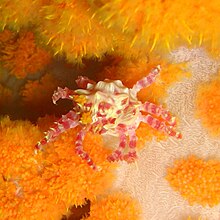Hoplophrys
| Hoplophrys oatesii | |
|---|---|

| |
| Scientific classification | |
| Domain: | Eukaryota |
| Kingdom: | Animalia |
| Phylum: | Arthropoda |
| Class: | Malacostraca |
| Order: | Decapoda |
| Suborder: | Pleocyemata |
| Infraorder: | Brachyura |
| Superfamily: | Majoidea |
| Family: | Epialtidae |
| Subfamily: | Pisinae |
| Genus: | Hoplophrys Henderson, 1893 |
| Species: | H. oatesii
|
| Binomial name | |
| Hoplophrys oatesii Henderson, 1893
| |
Hoplophrys is a monotypic genus of crab in the family Epialtidae. It contains the single species Hoplophrys oatesii, also known as the candy crab, Oates's soft coral crab, commensal soft coral crab and Dendronephthya crab.[1][2][3][4]
Description
[edit]Hoplophrys oatesii is a very colorful crab that grows from 1.5 to 2 cm (0.59 to 0.79 in). It lives on various species of soft coral in the genus Dendronephthya. It camouflages itself by mimicking the colours of the polyps among which it hides. It adds further camouflage by attaching polyps to its carapace. Colours vary depending on the colour of the coral, and may be white, pink, yellow or red.
The first pair of legs of this species has small claws. The body has pointed spines with a red and white pattern, similar in appearance to the host coral.[1]
Distribution and habitat
[edit]This crab is widespread in the Indo-Pacific in tropical climates. It is found in the benthic zone at depths of 1–90 metres (0–300 ft).[5]
Diet
[edit]Hoplophrys oatesii feeds on plankton.
References
[edit]- ^ a b "Candy crab Hoplophrys oatesii". Lembeh Resort resort and spa. Archived from the original on 2011-05-04.
- ^ "The Candy Crab - Identify tropical fish". Whats That Fish!. Retrieved 2012-06-03.
- ^ De Grave, Sammy (2019). "Hoplophrys". WoRMS. World Register of Marine Species. Retrieved 3 October 2024.
- ^ De Grave, Sammy (2022). "Hoplophrys oatesii Henderson, 1893". WoRMS. World Register of Marine Species. Retrieved 3 October 2024.
- ^ Palomares ML, Pauly D, eds. (2023). "Hoplophrys oatesii" in SeaLifeBase. March 2023 version.
Further reading
[edit]- J. R. Henderson (1893). "A contribution to Indian Carcinology". Transactions of the Linnean Society of London. (ser. 2). 5 (10): 325–458. doi:10.1111/j.1096-3642.1893.tb00653.x.
External links
[edit] Media related to Hoplophrys oatesii at Wikimedia Commons
Media related to Hoplophrys oatesii at Wikimedia Commons- Image
